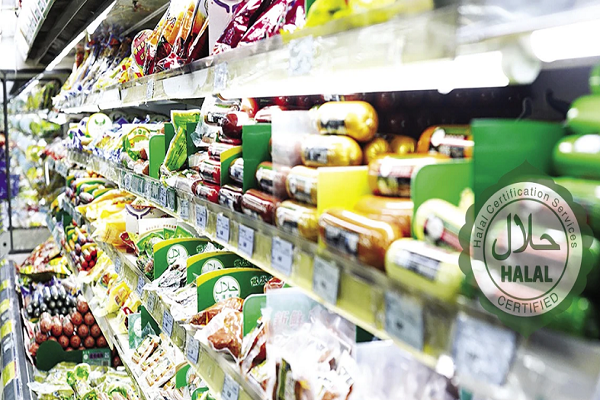Ahlulbayt News Agency: The Vietnam Academy of Social Sciences hosted the conference to share experience between Vietnam and partners globally in developing the Halal ecosystem domestically.
Addressing the event, Dr. Phan Chi Hieu, president of the Vietnam Academy of Social Sciences, emphasized that Vietnam is reinforcing cooperative relations with countries in South Asia, West Asia and Africa, opening up the door for the country to boost its exports to this lucrative but challenging market that requires halal standards.
There remains plenty of room to increase Vietnamese exports to the halal market as the global Muslim population is estimated to reach 2.18 billion people by 2030, or about 30% of the world’s population, with the market size valued at US$3 trillion by 2025, said the official.
The conference is expected to create opportunities for local businesses to increase exports, and attract greater investment and Muslim tourists, thereby further promoting cooperative ties between Vietnam and 57 countries of the Organization of Islamic Cooperation (OIC), as well as others around the world, said Hieu.
With regard to the development of the global Halal ecosystem and policy suggestions for the Vietnamese side, Assoc. Prof., Dr. Dinh Cong Hoang, head of the Middle East and West Asia Research Department, revealed that not many Vietnamese people, including businesses, have learnt about the halal system. In addition, the halal certification process in Vietnam remains complicated and not in line with international standards.
According to the expert, there are a number of challenges related to high costs facing Vietnamese firms when investing in production lines, specialized equipment, and safe raw materials in all stages of the halal global supply chain in line with relevant standards.
Furthermore, the development of infrastructure and State support are also needed to develop the industry in a sustainable manner, he stressed.
To develop the halal ecosystem locally, Dr. Hoang underlined the need to strengthen international cooperation, raise public awareness about the potential of the halal market, accelerate the "economic diplomacy" with Muslim countries, and speed up the signing of free trade agreements (FTAs) with these countries.
He also underscored the importance of establishing a Halal Certification Authority in Vietnam (HALCERT) in a bid to further boost the granting of halal certificates to businesses, increase export activities in priority areas, and step up the digital transformation and e-commerce process to increase exports to relevant markets.
It's imperative to sign mutual recognition agreements on halal standards with Muslim countries, he suggested.
The same day saw the Institute of South Asian, West Asian and African Studies (ISAWAAS) make its debut in the presence of leaders of the Vietnam Academy of Social Sciences, representatives of diplomatic agencies of Asian and African countries in Vietnam, experts, scientists, partners, and domestic and foreign businesses.
/129
Addressing the event, Dr. Phan Chi Hieu, president of the Vietnam Academy of Social Sciences, emphasized that Vietnam is reinforcing cooperative relations with countries in South Asia, West Asia and Africa, opening up the door for the country to boost its exports to this lucrative but challenging market that requires halal standards.
There remains plenty of room to increase Vietnamese exports to the halal market as the global Muslim population is estimated to reach 2.18 billion people by 2030, or about 30% of the world’s population, with the market size valued at US$3 trillion by 2025, said the official.
The conference is expected to create opportunities for local businesses to increase exports, and attract greater investment and Muslim tourists, thereby further promoting cooperative ties between Vietnam and 57 countries of the Organization of Islamic Cooperation (OIC), as well as others around the world, said Hieu.
With regard to the development of the global Halal ecosystem and policy suggestions for the Vietnamese side, Assoc. Prof., Dr. Dinh Cong Hoang, head of the Middle East and West Asia Research Department, revealed that not many Vietnamese people, including businesses, have learnt about the halal system. In addition, the halal certification process in Vietnam remains complicated and not in line with international standards.
According to the expert, there are a number of challenges related to high costs facing Vietnamese firms when investing in production lines, specialized equipment, and safe raw materials in all stages of the halal global supply chain in line with relevant standards.
Furthermore, the development of infrastructure and State support are also needed to develop the industry in a sustainable manner, he stressed.
To develop the halal ecosystem locally, Dr. Hoang underlined the need to strengthen international cooperation, raise public awareness about the potential of the halal market, accelerate the "economic diplomacy" with Muslim countries, and speed up the signing of free trade agreements (FTAs) with these countries.
He also underscored the importance of establishing a Halal Certification Authority in Vietnam (HALCERT) in a bid to further boost the granting of halal certificates to businesses, increase export activities in priority areas, and step up the digital transformation and e-commerce process to increase exports to relevant markets.
It's imperative to sign mutual recognition agreements on halal standards with Muslim countries, he suggested.
The same day saw the Institute of South Asian, West Asian and African Studies (ISAWAAS) make its debut in the presence of leaders of the Vietnam Academy of Social Sciences, representatives of diplomatic agencies of Asian and African countries in Vietnam, experts, scientists, partners, and domestic and foreign businesses.
/129

